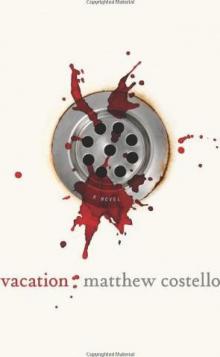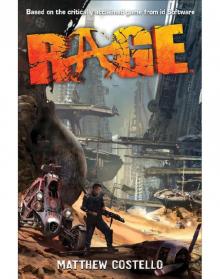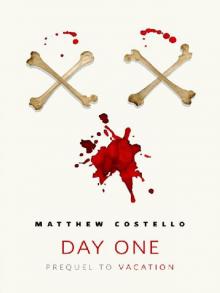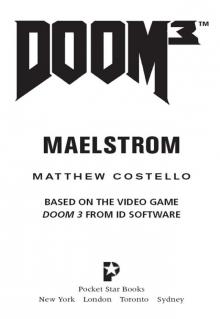- Home
- Matthew Costello
Beneath Still Waters Page 26
Beneath Still Waters Read online
Page 26
off her forehead.
“Oh, nothing. Just something . . . funny.” She turned
248
m a t t h e w j . c o s t e l l o
and looked at her daughter. “Let me finish checking this
file and we’ll ‘do lunch,’ okay, guy?”
Claire nodded. “And after lunch?”
“I have to go over to the dam.”
Claire’s face sagged.
Susan shook her head and went back to her clippings.
Wilson Smith, Conservator of Ephemera, had the book
spread out on a large, plastic-covered table. The book was in
three soggy, lumpish pieces. Smith wore plastic gloves, and
a battery of draftsman’s lamps bathed the table in brilliant
white light.
Smith, a pear-shaped fellow with wire-frame bifocals
and two small tufts of gray hair on either side of an other-
wise bald head, was mildly discouraged by the item in
front of him.
He normally worked with distressed ephemera. Dam-
aged thousand-dollar stamps, torn covers to the first issue
of Superman (worth $40,000 in mint condition), rare and
valuable books with split bindings and loose pages. He
could fill holes with a liquid substance that dried into the
paper, easily match whatever yellowish shade of paper he
was working on. He would carefully remove “magic”
tape, touch up the color on the cover, and give the whole
book a sharp, glossy look, increasing its value by a cou-
ple of hundred dollars.
But this . . . this looked hopeless. This wasn’t distressed
material.
It was destroyed.
“Oh, boy,” he said aloud, breaking the quiet of his base-
ment lab. He had dropped everything, at the police chief ’s
request, to work on this. A squad car waited outside for any-
thing he could salvage.
“Oh, boy.” He sighed again. He reached down and
b e n e a t h s t i l l w a t e r s
249
touched the larger part of the book. True, it was all stuck
together, like a paper brick. But as his latex-coated fingers
gently probed the perimeter of the book, he saw that the
pages, by and large, still seemed fairly separate.
He brought his hands back to his chest.
Well, then, there’s some hope. He could dry the book
page by page, using the heat lamps, and pull the pages apart
one by one. Of course, some would be lost, permanently
stuck together. (And all those little worm holes running
through it didn’t make the job any easier.)
And a lot of it would be smeared. Totally illegible.
But—yes. He figured he would save about half the book.
He walked over to his storage shelves and brought over
a pair of high-intensity heat lamps.
Dan sat, then stood, then sat, in the lime-green waiting
room. Once in a while he wandered out to the front desk of
the police station. But the bustling activity of the sergeant
made him feel uncomfortable and in the way.
I can’t spend all day here. If I have to push Rogers to the
point of arresting me, then so be it.
But first he wanted to call Susan. She had been so angry
at him the night before. (Just when things were going well.
A typical Dan Elliot move.)
But he was sitting there with those notebooks, trying to
figure out what the hell was going on. The idea of Susan
near the lake was enough to give him the creeps.
And where had Billy wandered off to?
(He had wandered off, hadn’t he? Hadn’t he?)
You couldn’t blame him. The old guy looked like his
memories were washing over him, ready to knock him
down. So he probably left.
But where did he go? The two cops remembered seeing
him there, but they didn’t see him walk away.
250
m a t t h e w j . c o s t e l l o
Where the hell are you, Billy? I could use you to back up
my story. Your story.
He walked back to the small pay phone, just outside the
cluster of jail cells at the back of the station.
(How many two-bit hoods made their one call from here?)
He popped a quarter in and asked information for the
number of the Ellerton Register. If he was lucky, he could smooth things over with Susan. Having nothing to scribble
down the number with, he repeated it aloud, then hung up
and dialed quickly.
“Susan Sloan, please.”
Then, after a long wait, the operator came back on the
line. She was gone, out to lunch. Perhaps he could try later.
Someone tapped him on the shoulder.
He turned and saw Rogers.
“Thought you’d like to know, there was a small quake this
morning. Little over an hour ago. Nothing much compared
to Monday’s shock. But my boys felt it over at the reservoir.”
Rogers looked him squarely in the eye. “Good thing you
weren’t down there when it happened.”
Yes, he thought. Might have been nasty inside that steeple.
He might have stayed trapped.
“Oh, and Mr. Smith called. Said things aren’t quite as
bad as we imagined. In fact, he should have half the diary
ready in a couple of hours.”
“Good.”
“No word from your friend, Billy Leeper?”
Dan shook his head.
Rogers smiled. “Well, let’s just sit tight until we get a
look at the book, agreed?”
“Sure,” Dan said, and made his way back the ugly green
waiting room.
Max Wiley was finishing his chili dog, taking special care not
to drip any of the dollops of red goo onto his seersucker suit.
b e n e a t h s t i l l w a t e r s
251
He was parked just in front of the barricade closing the
roadway to the dam. There was a big gray New York State
truck next to him.
He took a long sip of his diet Pepsi.
No workers. There were some cops down by the beach,
too damned engrossed in talking to one another to notice
shit. But it sure as hell looked like the workers were done
and gone.
He popped the last chunk of his hot dog into his mouth
and stepped out of his car.
The banner was done, and it looked as smashing as he
hoped it would. It was enormous, proclaiming, ellerton–
gouldens falls fifty-year celebration with the words
KENICUT DAM even larger.
He walked up to the roadway. There was even a scatter-
ing of people down in the plaza, milling about, looking at
the dam and the banner.
He kept walking, across the closed roadway. (Got to get
it open by tonight, he thought. Everything’s got to be all set
for the celebration. No screwups allowed.)
He reached the door leading into the dam. He yanked on
the heavy L-shaped handle, but it didn’t budge. He pulled
futilely at the door.
All locked up. Why, then, they must have finished the
repair job. Yeah, finished up and gone off for some lunch.
Great! He felt exhilarated. Now things could get
rolling again. He walked briskly back to his car. He’d
call Rogers and tell him . . .
tell him that everything was
fine, the repair was finished, and please get the barriers
down.
(And if he wanted to keep the cops on duty, that was
fine. Just don’t go scaring the townspeople.)
Then he’d head home, catch a few hours sleep before
getting ready for the costume party at the Stonehill Country
Club.
(Where he hoped he’d get a chance to thank Mr. Martin
252
m a t t h e w j . c o s t e l l o
Parks for his ever so generous contribution to his upcoming
campaign.)
He pulled his jacket close.
He buttoned all the buttons, but the material was so thin,
it didn’t help.
Strange, but it sure was cold today.
T W E N T Y - O N E
The closer they got to the dam, the more weird Claire felt.
She thought of pretending she was sick, maybe start
coughing, really hacking, or something, just to get her mom to go home.
But then her mother would just drop her there, maybe
call horrible Mrs. Jones to come over and take care of her,
and then head back to the dam. By herself.
And she didn’t want that.
No, she was maybe the only one who understood the
danger.
’Cause I’ve seen it. Night after night—
“Here we are,” her mom said, pulling their Rabbit off
the road.
“Darn! The roadway’s still closed. I thought they’d have
the thing repaired by now, opened and—” Her mother
looked at her, running her hand through her hair. “You wait
here, okay, honey? I just want to talk to the police, maybe
jot down a few notes. Okay?”
“No.”
254
m a t t h e w j . c o s t e l l o
Her mother gave her her best annoyed look. “What do
you mean, no?”
“I want to come. I’ll stay . . . out of the way.”
Her mother shrugged. “C’mon, then. I don’t know”—
she opened the door—“how you expect me to become a
rich and famous reporter with an overly imaginative eleven-
year-old tagging along.”
She trailed behind her mother, looking all around as
they walked down to the beach and the two policemen.
She knew enough to stay back and let her mother talk.
And again she looked at the lake. It was completely flat
now, gray like the sky, flat like a piece of sheet metal.
Claire almost expected it to—what?—move, react to her
coming?
’Cause I’m here. I’m here and I know about you. I know
what you’re trying to do.
She shivered. Then she looked up to the woods and hills
on the other side of the lake. She could just make out the
Bennys’ house through tiny chinks in the trees. Bits of their
wooden deck, small splotches of wood, the big, black gas
barbecue.
So close . . . so close to the lake.
She was glad she didn’t live there.
But then she thought of the two children.
And she was scared for them.
“Thank you. We’ll just walk over and back. I appreciate
it.” Her mother had finished with the two policemen.
“We’re going now?” Claire asked hopefully.
Her mother shook her head. “No, sweetheart, I’m walk-
ing over to the other side. From there I can see the beach,
and some of the other spots more . . . er, clearly. Up that
way, missy.” She pressed an imaginary button on Claire’s
nose and pointed her head up to the closed roadway. “I can
describe the place the way it really is. You can wait in the
car if you’d like. I’ll be right back.”
b e n e a t h s t i l l w a t e r s
255
“I’ll come along,” Claire said hurriedly, forcing a smile
onto her face.
“Suit yourself.”
She walked next to her mother, right next to her.
And the water seemed a bit different now.
It wasn’t just flat anymore.
She could here it softly splashing against the wall. And
out there, out where she didn’t like to look, it seemed to
make tiny little waves.
Claire turned and looked up at the trees.
There was no wind.
Her mother kept walking.
“God, it’s cold here,” she said.
They’d almost reached the other side, right near the
other police barrier.
“Okay, sweetheart, this is fine. Right here.”
Her mother was scribbling words down in her narrow
reporter’s notebook. Claire looked around.
(Stay away from the edge, she told herself. Just stay
away.)
But then her mother took a step closer, as if to get a bet-
ter look at something across the water.
“Mom!” she said, yelling without thinking about it.
“What, honey? What’s wrong?”
“N-not so close,” she said, stammering. “Not so close
to the edge.”
Susan shook her head, then begrudgingly humored her.
She took two steps away. “There. Is that better?”
Claire nodded.
She looked around the lake, following the twisting
shoreline, around and around and around, until—
She was looking at the Benny house.
They were near it now, it was just up a small hill. But her
eyes followed a trail through the woods, down to the fence
line. She saw something. On the ground.
256
m a t t h e w j . c o s t e l l o
A blackish lump. Lying half on one side, half on the
other side, of the fence.
“Mom . . . Mom!”
“What now?” Susan snapped.
“Something’s wrong at the Bennys’. Something with
Joshua and Samantha—”
Susan looked over at the house and the fence. “What-
ever are you talking about? How can you see?”
“There’s something over there, down by the fence. Don’t
you see it?”
“See what?” she said, squinting. “There’s no—”
But then her mother saw it.
(And that pause scared Claire more than anything she
had ever dreamed or imagined.)
“You’re right. There’s something there. Okay, we’d bet-
ter go back and—”
They both turned.
The police were gone.
Susan reached out and took her daughter’s hand. “We’d
better go—”
“No.” Claire gave her mom’s hand a hard tug. “Not that
way, Mom. We have to get Joshua and Samantha out of
there. Now, Mom. Now. Because, because—”
(They’re coming. From the water. Soon. Oh so soon.)
“Okay,” her mom said. “We’ll call the police from there.”
Claire was tugging her along, They ran, first off the
roadway, then up the small trail made by the high-school
kids who liked to sneak beers, and then up toward the
Benny house.
He picked up the phone and misdialed the number, getting,
instead of the switchboard at the Ellerton Register, some Latino hausfrau.
“Sorry,” he mumbled, and he dialed again. This time he
made the right connection.
b e n e a t h s t i l l w a t e r s
257
Susan Sloan was still out of the office.
He hung up. Out of the office. And just where could
she be? Where, oh, where—
He knew damn well where.
He walked over to Rogers’s office to announce that he
was leaving—unless the chief wanted to press charges. He
knocked on his door.
A young cop came hurrying through the double glass
doors, a thick brown envelope held tightly to his side.
The cop walked right up to Rogers’s door, next to Dan.
Rogers opened it himself.
“Yes, what is it—”
He stared at the envelope, knowing what it must be. The
diary.
“It’s the first half of the material, sir, from Mr. Smith.
He thought it should be brought straight over. He’ll have
the rest in a few hours.”
Rogers took the envelope and looked right at Dan.
“Shall we look it over together?”
“I—”
(I was on my way out. Leaving. To look for Susan. But
with the pages of the diary here . . . so close . . . maybe he
could wait just a bit.)
“Sure.”
“Mr. Smith said he did the best he could, but whole
pages were useless.”
Rogers nodded. “Come in, Dan. Let’s look at what
we’ve got here.”
He closed the door behind Dan.
Claire ran ahead, and Susan had to struggle to keep her in
sight.
My God, she thought, finally reaching the edge of the
Benny property, this house is secluded. A long gravel road-
cum-driveway led down to a narrow service road that ran
258
m a t t h e w j . c o s t e l l o
around the reservoir and then up to Pennington State Park,
just to the northeast.
The reservoir was surrounded by county-owned prop-
erty. It was beautiful, the sleek wooden house, all angles
and glass, with a neat lawn around it. There were tremen-
dous pine trees, a few maples, and—standing near the cen-
ter of the backyard—a full, plump willow.
“Claire!” she called, but her daughter ran ahead, hurry-
ing, driven—terrified.
I’m scared too, she admitted. Something wrong with my daughter, and I don’t know what it is.
Claire ran up to the back door, a sliding door.
“Claire!” Susan called futilely. She ran as fast as she
could.
She found Claire kneeling on the floor (the TV on and
blaring), right beside Joshua, who was crying. Claire looked
up at her.
“Joshua says they’ve been alone all morning.”
“Alone?”
Joshua nodded. “Our mommy wasn’t here when we

 Cherringham--Too Many Lies
Cherringham--Too Many Lies Mydworth Mysteries - A Shot in the Dark (A Cosy Historical Mystery Series Book 1)
Mydworth Mysteries - A Shot in the Dark (A Cosy Historical Mystery Series Book 1) Cherringham--The Gentleman Vanishes
Cherringham--The Gentleman Vanishes Cherringham--Cliffhanger
Cherringham--Cliffhanger Beneath Still Waters
Beneath Still Waters Cherringham--Trail of Lies
Cherringham--Trail of Lies The Gentleman Vanishes
The Gentleman Vanishes Mydworth Mysteries--Murder wore a Mask
Mydworth Mysteries--Murder wore a Mask Mydworth Mysteries--London Calling!
Mydworth Mysteries--London Calling! Cherringham--Killing Time
Cherringham--Killing Time Mydworth Mysteries--The Wrong Man
Mydworth Mysteries--The Wrong Man Cherringham - The Drowned Man
Cherringham - The Drowned Man Cherringham--Killer Track
Cherringham--Killer Track Cherringham--The Secret of Brimley Manor
Cherringham--The Secret of Brimley Manor A Deadly Confession
A Deadly Confession Cherringham--Murder under the Sun
Cherringham--Murder under the Sun Cherringham - A Dinner to Die For
Cherringham - A Dinner to Die For Family
Family Cherringham--Death Trap
Cherringham--Death Trap Cherringham--The Curse of Mabb's Farm
Cherringham--The Curse of Mabb's Farm Vacation
Vacation Cherringham--A Bad Lie
Cherringham--A Bad Lie Doom 3™: Worlds on Fire
Doom 3™: Worlds on Fire Cherringham--Scared to Death
Cherringham--Scared to Death Home
Home Dead in the Water
Dead in the Water Star Road
Star Road Rage
Rage Cherringham--A Fatal Fall
Cherringham--A Fatal Fall Jack Murphy_Prequel_Day One
Jack Murphy_Prequel_Day One Doom 3™: Maelstrom
Doom 3™: Maelstrom